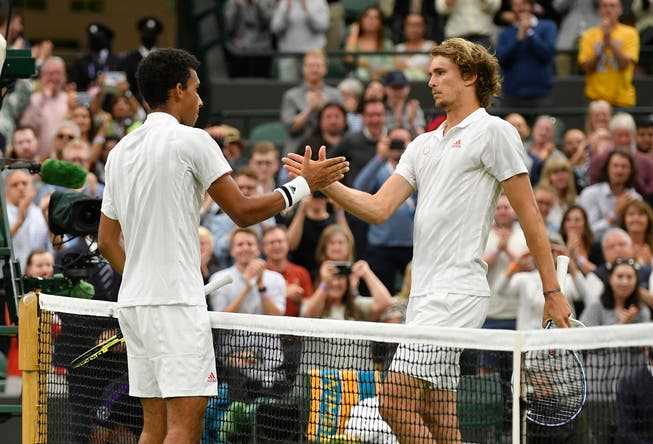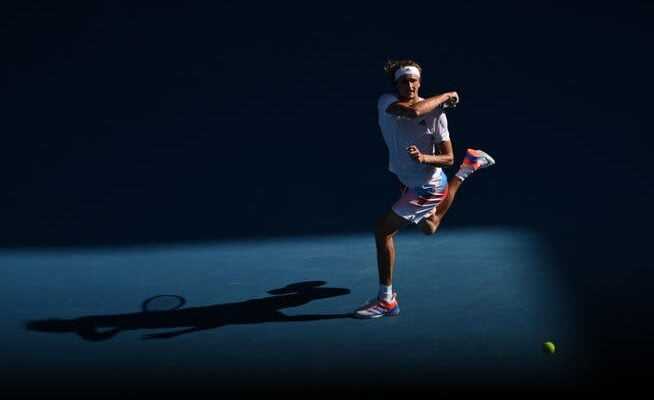New year, old story: Alexander Zverev loses the round of 16 against Denis Shapovalov in three sets at the Australian Open. Nothing fits together with the tennis Olympic champion that day, nothing reminds of the strong last season.
In the game against Denis Shapovalov, Alexander Zverev was missing back and front, up and down, right and left.
If you don’t expect uncertainty in sport, you’re slightly wrong, but sometimes you think you have an idea of how things could go. Sure, Alexander Zverev hadn’t played brilliantly in the first week of the Australian Open in Melbourne, but last season’s glorious end seemed to weigh more as a promise of further great deeds.
As Olympic champion, winner of the ATP finals and athlete of the year in Germany, Zverev had said goodbye to the 2021 season, and when the new year began, everyone was saying the chances of his first Grand Slam title were better than ever. The landmark match, it was thought, would be a quarter-final against Rafael Nadal. But that can no longer be said.
Enigmatic shape
In a mysterious way, Zverev lost to Denis Shapovalov in three sobering sets 3: 6, 6: 7, 3: 6 on Sunday, and sometimes it looked as if he wasn’t there at all. From start to finish, Zverev didn’t find his way in this game and he hardly ever took any of the chances the Canadian gave him. He played helplessly and aimlessly, and when Shapovalov also showed weaknesses, served double faults and repeatedly opened the door to the game more than just a crack, nothing changed.
With a few exceptions, Zverev accepted the events, but the helpless looks at his people in the stands spoke volumes. There was one who felt, with increasing frustration, that he didn’t play nearly well enough, didn’t have nearly enough self-confidence to turn the tide. This game seemed like an extremely cold pour on the hottest day of the tournament up to that point.
The big question after that was: Why? Where was the self-confidence with which he said goodbye to the short winter break in December – surrounded by applause after the successes of the past year? Zverev said he had no idea. “I had a good break, I had good preparation. There is no excuse. I have to be better, I have to do better. It’s no one else’s fault; not the coach, not my team, just me.”
He thinks the last time he played as bad as in Melbourne was when he lost in the round of 16 at Wimbledon in 2021. At that time, Zverev lost to another Canadian, Félix Auger-Aliassime, which was a little easier to explain because at that time he shot himself in the knee with twenty double faults. This time there were only eight, Shapovalov had eleven – and still won easily.

The last time he was eliminated so quietly was also against a Canadian – Félix Auger-Aliassime, pictured here on the left.
After the defeat at Wimbledon, Zverev said: “You have to have inner peace to be able to play your best tennis.” This calm was obviously not there from the start in the first week of the Australian Open. In the game against Shapovalov, there was a lack of back and front, up and down, right and left. All over. Zverev said he has no idea where to look for the reason and after a performance like this it would be silly to talk about a goal like number one. If Zverev had won the Australian Open, it would have been possible to jump to the top of the world rankings in early February. “First of all, I have to find out what’s wrong with me.”
For the time being, it remains the case that Germany’s best tennis player, number three in the world, has to wait for a Grand Slam title. You can twist and turn the matter as you like: Without even remotely underestimating the value of the Olympic gold medal – Grand Slam titles are the currency on the world tennis exchange, and this account is still empty at Zverev.
Djokovic’s absence seemed to play into his hands
This time it seemed as if the conditions for the first coup at the highest level were particularly good, and the fact that colleague Novak Djokovic was finally missing in his half of the table seemed to play into his hands. But it wasn’t the opponents, he was obviously getting in his own way, and that doesn’t make things any easier.
After the golden end of last season, did Zverev think it would continue seamlessly? Former colleague Maria Sharapova once said that the good thing about tennis is that the net is pulled up again every day. I mean, there’s always a new chance. But it also means: you have to prove yourself every day; yesterday’s victory means nothing today. The last word of the disappointed, helpless loser sounded like this: «I will still do everything to hold up a Grand Slam trophy at some point. At the moment I’m a long way from that.”
Rafael Nadal, on the other hand, continues on course and is now preparing for Tuesday’s encounter against Shapovalov. In his victory in the round of 16 against Adrian Mannarino (7: 6, 6: 2, 6: 2), Nadal allowed himself a tie-break that lasted almost 29 minutes and ended with 16:14. In just under half an hour, the Spaniard fended off four set balls from the Frenchman in the well-known way: the wires of his game glowed every second.
Melbourne. Australian Open. Grand Slam tournament (49.71 million Swiss francs / Hart). Men. Round of 16: Denis Shapovalov (CAN/14) sees Alexander Zverev (GER/3) 6: 3, 7: 6 (7: 5), 6: 3. Rafael Nadal (ESP/6) sees Adrian Mannarino (FRA) 7: 6 (16:14), 6: 2, 6: 2. Matteo Berrettini (ITA/7) sees Pablo Carreño Busta (ESP/19) 7: 5, 7: 6 (7: 4), 6: 4. Gaël Monfils (FRA/17) sees Miomir Kecmanovic (SRB) 7: 5, 7: 6 (7: 4), 6: 3. – Quarter-final tableau: Monfils (17) – Berrettini (7), Shapovalov (14) – Nadal (6); De Minaur (32)/Sinner (11) – Fritz (20)/Tsitsipas (4), Cilic/Auger-Aliassime (9) – Cressy/Medvedev (2).
Women. Round of 16: Ashleigh Barty (AUS/1) sees Amanda Anisimova (USA) 6: 4, 6: 3. Barbora Krejcikova (CZE/4) sees Viktoria Asarenka (BLR) 6:2, 6:2. Jessica Pegula (USA/21) sees Maria Sakkari (GRE/5) 7: 6 (7: 0), 6: 3. Madison Keys (USA) sees Paula Badosa (ESP/8) 6-3, 6-1. – Quarter-final tableau: Barty (1) – Pegula (21), Krejcikova (4) – Keys; Collins (27)/Mertens (19) – Halep (14)/Cornet, Swiatek (7)/Cirstea – Kanepi/Sabalenka (2).
